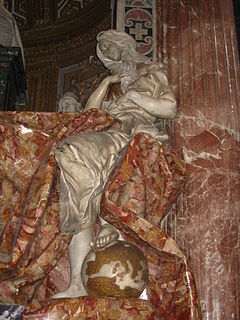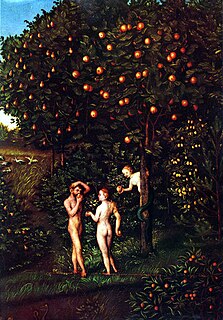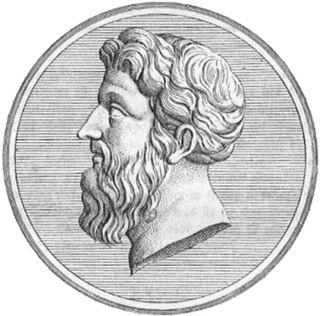A brocard is a legal maxim in Latin that is, in a strict sense, derived from traditional legal authorities, even from ancient Rome. The word is a variant of the Latinized name of Burchard of Worms, Bishop of Worms, Germany, who compiled 20 volumes of Ecclesiastical Rules.

In Roman mythology, Veritas, meaning Truth, is the Goddess of Truth, a daughter of Saturn, and the mother of Virtus. She is also sometimes considered the daughter of Jupiter, or a creation of Prometheus. The elusive goddess is said to have hidden in the bottom of a holy well. She is depicted both as a virgin dressed in white and as the "naked truth" holding a hand mirror.

In Judaism and Christianity, the tree of the knowledge of good and evil is one of two specific trees in the story of the Garden of Eden in Genesis 2–3, along with the tree of life. Alternatively, some scholars have argued that the tree of the knowledge of good and evil is just another name for the tree of life.
Malum in se is a Latin phrase meaning wrong or evil in itself. The phrase is used to refer to conduct assessed as sinful or inherently wrong by nature, independent of regulations governing the conduct. It is distinguished from malum prohibitum, which is wrong only because it is prohibited.
Semper fidelis is a Latin phrase that means "always faithful" or "always loyal". It is the motto of the United States Marine Corps, usually shortened to Semper Fi. It is also in use as a motto for towns, families, schools, and other military units.
Malum prohibitum is a Latin phrase used in law to refer to conduct that constitutes an unlawful act only by virtue of statute, as opposed to conduct that is evil in and of itself, or malum in se.

Plus ultra is a Latin phrase and the national motto of Spain. A reversal of the original phrase non plus ultra, said to have been inscribed as a warning on the Pillars of Hercules at the Strait of Gibraltar, it has metaphorical suggestions of taking risks and striving for excellence. Its original version, the personal motto of the Holy Roman Emperor Charles V, also Duke of Burgundy and King of Spain, was Plus oultre in French. The motto was adopted some decades after the discovery of the New World by Christopher Columbus.

Forbidden fruit is a name given to the fruit growing in the Garden of Eden which God commands mankind not to eat. In the biblical story, Adam and Eve eat the fruit from the tree of the knowledge of good and evil and are exiled from Eden.
And the Lord God commanded the man, saying, Of every tree of the garden thou mayest freely eat: But of the tree of the knowledge of good and evil, thou shalt not eat of it: for in the day that thou eatest thereof thou shalt surely die.
Sapere aude is the Latin phrase meaning "Dare to know"; and also is loosely translated as “Have courage to use your own reason”, "Dare to know things through reason", or even more loosely as "Dare to be wise". Originally used in the First Book of Letters, by the Roman poet Horace, the phrase Sapere aude became associated with the Age of Enlightenment, during the 17th and 18th centuries, after Immanuel Kant used it in the essay, "Answering the Question: What Is Enlightenment?" (1784). As a philosopher, Kant claimed the phrase Sapere aude as the motto for the entire period of the Enlightenment, and used it to develop his theories of the application of reason in the public sphere of human affairs.

The Latin phrase mortuis nihil nisi bonum "Of the dead, [say] nothing but good", abbreviated as Nil nisi bonum, is a mortuary aphorism, indicating that it is socially inappropriate to speak ill of the dead as they are unable to justify themselves.

"In hoc signo vinces" is a Latin phrase conventionally translated into English as "In this sign thou shalt conquer".

The Great Seal of Missouri is used to authenticate certain documents issued by the Government of Missouri. The phrase is used both for the physical seal itself, which is kept by the secretary of state, and more generally for the design impressed upon it. The Great Seal was designed by Robert Wells of Jefferson City.

Dum spiro spero, which translates to "While I breathe, I hope." is a Latin phrase of indeterminate origin. It is the motto of various places and organisations, including the U.S. state of South Carolina.

"Fortune favours the bold", "Fortune favours the brave" and "Fortune favours the strong" are common translations of a Latin proverb. The slogan has been used historically by people in the military in the Anglosphere, and it is used up to the present on the coats of arms of individual families and clans.

"That they all may be one" is a phrase derived from a verse in the Farewell Discourse in the Gospel of John (17:21) which says:
that they may all be one. As you, Father, are in me and I am in you, may they also be in us, so that the world may believe that you have sent me.
The Anáhuac Cancún University belongs to the Anahuac University Network, affiliated with the Anahuac University Network (RUA), the international education system of the Legion of Christ, in 18 countries and serving over 100,000 students from kindergarten to graduate school.

The Anahuac University Network is a private universities system grouped and administered by the religious congregation of the Legion of Christ. The network is composed of several universities, some with different names and educational approaches. The universities are located in different countries of the world, having presence in Mexico, United States, Chile, Spain, Italy and France.

Ad maiorem Dei gloriam or Ad majórem Dei glóriam, also rendered as the abbreviation AMDG, is the Latin motto of the Society of Jesus (Jesuits), an order of the Catholic Church. It means "For the greater glory of God."
St. Paul's Senior High School or St. Paul's Boys College, formerly St. Paul's Secondary, is a Ghanaian boys' senior high school located at Hatsukope-Denu in the Ketu South Municipal District of the Volta Region.

Romans 12 is the twelfth chapter of the Epistle to the Romans in the New Testament of the Christian Bible. It is authored by Paul the Apostle, while he was in Corinth in the mid 50s AD, with the help of an amanuensis (secretary), Tertius, who adds his own greeting in Romans 16:22.